11th ANNIVERSARY OF SREBRENICA MASSACRE COMMEMORATED
11th ANNIVERSARY OF THE MASSACRE
- DO NOT FORGET! -
- DO NOT FORGET! -
"Exactly half a century after the end of World War II we allowed genocide to take place under our eyes. We failed the victims of this genocide in life and we will fail them in death unless we ensure that the remains of each and every one of them are buried with dignity, and that the perpetrators - each and every one of them - are brought to justice," the international community's High Representative to Bosnia, German diplomat Christian Schwarz- Schilling said in his message to honour the Srebrenica victims.
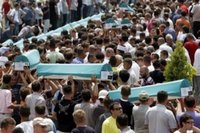 SREBRENICA - More than 40,000 mourners gathered Tuesday in the eastern Bosnian village of Potocari, near the town of Srebrenica, for the burial of 505 victims - aged 15 to 78 - of the 1995 massacre.
SREBRENICA - More than 40,000 mourners gathered Tuesday in the eastern Bosnian village of Potocari, near the town of Srebrenica, for the burial of 505 victims - aged 15 to 78 - of the 1995 massacre.Mourners gathered Tuesday in the eastern Bosnian village of Potocari, near the town of Srebrenica, for the burial of 505 victims of the 1995 massacre in that town.
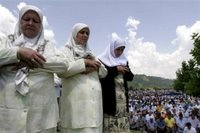 During a commemoration titled 'Do Not Forget!' which marked the 11th anniversary of the massacre, 505 caskets wrapped in green were laid in fresh graves next to nearly 2,000 victims of the Srebrenica massacre buried in the Potocari Memorial Centre during the last three years.
During a commemoration titled 'Do Not Forget!' which marked the 11th anniversary of the massacre, 505 caskets wrapped in green were laid in fresh graves next to nearly 2,000 victims of the Srebrenica massacre buried in the Potocari Memorial Centre during the last three years.Bosnian Serb troops massacred over 8,100 Bosniak men after capturing the former eastern Bosniak enclave of Srebrenica on 11 July 1995, during the 1992-1995 war in Bosnia-Herzegovina. There are still more than 3,500 body bags filled with human bones awaiting identification.
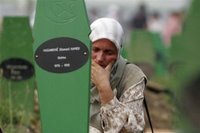 Meanwhile, new Srebrenica victims were being unearthed at one of the largest mass graves discovered last month in the village of Kamenica, some 30 kilometers from Srebrenica. Among them - body remains of children; the youngest victim was a 10 year old girl.
Meanwhile, new Srebrenica victims were being unearthed at one of the largest mass graves discovered last month in the village of Kamenica, some 30 kilometers from Srebrenica. Among them - body remains of children; the youngest victim was a 10 year old girl.Less than one third of the missing Srebrenica men and underage boys have been exhumed and identified from 64 mass graves in eastern Bosnia.
'I finally found him and now I am losing him again,' an old woman cried while embracing the casket containing the bones of her son.
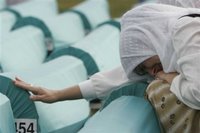 A younger woman caressed a casket as relatives stood next to her.
A younger woman caressed a casket as relatives stood next to her.'This is our father we are burying today. He was an invalid and he could not escape,' Refik Karamehic and his sister Suada said, adding their mother was also executed by a firing squad in Srebrenica.
More than 40,000 people, including female survivors of the massacre, prayed amid tears in and around the Potocari Memorial Centre.
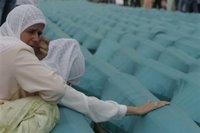 The men, following Islamic tradition, passed the caskets from hand to hand to their final destination.
The men, following Islamic tradition, passed the caskets from hand to hand to their final destination.'The time is counted in a different way in Potocari, New York and The Hague since 11 July 1995. Since then, nothing is the same,' Bosnian Muslim religious leader Reisu-l-ulema Mustafa Ceric said after the prayer.
The case of Srebrenica, he said, showed how 'the big ones became little, how the powerful ones became shameful and the powerless became stronger in belief that the justice is reachable and that no- one can escape it.'
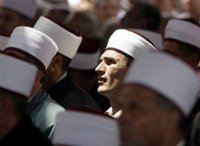 Ceric's message was seen as a criticism of the United Nations which failed to protect the civilian population in Srebrenica, which was under UN protection as a safe haven when the massacre occurred in 1995.
Ceric's message was seen as a criticism of the United Nations which failed to protect the civilian population in Srebrenica, which was under UN protection as a safe haven when the massacre occurred in 1995.The religious leader also protested over the fact that the two alleged masterminds of the massacre, the former Bosnian Serb leader Radovan Karadzic and his military commander general Ratko Mladic, remain at large.
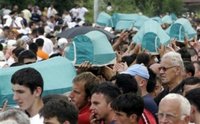 'Each time I think of Srebrenica, I have to ask myself what more we could and should have done to prevent the slaughter in what was, after all, a UN-declared safe haven,' the international community's High Representative to Bosnia, German diplomat Christian Schwarz- Schilling said in his message to honour the Srebrenica victims.
'Each time I think of Srebrenica, I have to ask myself what more we could and should have done to prevent the slaughter in what was, after all, a UN-declared safe haven,' the international community's High Representative to Bosnia, German diplomat Christian Schwarz- Schilling said in his message to honour the Srebrenica victims.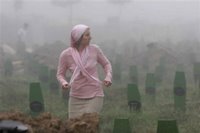 'Exactly half a century after the end of World War II we allowed genocide to take place under our eyes. We failed the victims of this genocide in life and we will fail them in death unless we ensure that the remains of each and every one of them are buried with dignity, and that the perpetrators - each and every one of them - are brought to justice,' said Schwarz-Schilling.
'Exactly half a century after the end of World War II we allowed genocide to take place under our eyes. We failed the victims of this genocide in life and we will fail them in death unless we ensure that the remains of each and every one of them are buried with dignity, and that the perpetrators - each and every one of them - are brought to justice,' said Schwarz-Schilling.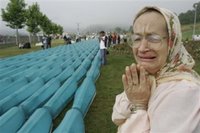 The Chief Prosecutor of The Hague-based International Criminal Tribunal for the former Yugoslavia (ICTY) Carla Del Ponte also came to Potocari to pay respect to the victims of the massacre and express her protest because Karadzic and Mladic remain at large more than a decade after the ICTY indicted them for war crimes and genocide.
The Chief Prosecutor of The Hague-based International Criminal Tribunal for the former Yugoslavia (ICTY) Carla Del Ponte also came to Potocari to pay respect to the victims of the massacre and express her protest because Karadzic and Mladic remain at large more than a decade after the ICTY indicted them for war crimes and genocide.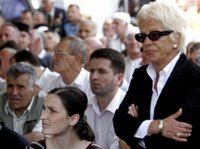 'I am here to pay tribute to the victims, to support the survivors and to express my frustration over the fact that Karadzic and Mladic are still at large,' said Del Ponte.
'I am here to pay tribute to the victims, to support the survivors and to express my frustration over the fact that Karadzic and Mladic are still at large,' said Del Ponte.Representatives of several non-governmental organizations from neighbouring Serbia also attended the commemoration, while Serbian Deputy Premier Ivana Dulic-Markovic issued a statement in Belgrade.
'Srebrenica remains on the conscience of all humanity, because not enough was done to stop the mass-murder,' Dulic-Markovic said in the statement.
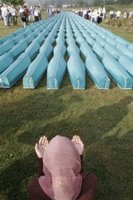 She also said those who committed the massacre must be brought to justice and punished for the sake of 'reconciliation in Bosnia- Herzegovina, the region and Europe.'
She also said those who committed the massacre must be brought to justice and punished for the sake of 'reconciliation in Bosnia- Herzegovina, the region and Europe.''A crime must neither be hidden, nor remain unpunished. It is impossible to erase pain or change the past, but we can and must jointly reach the truth and justice,' said Dulic-Markovic.
After years of denial Serbia last year opened a trial against a group of Serbian soldiers who were video-taped executing a group of Bosniaks from Srebrenica in July 1995.
Seven top Bosnian Serb military officials are to go on trial on Friday before the UN war crimes court in connection with the massacre.
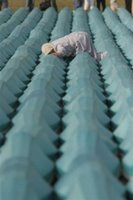 Their case is the largest joint trial ever seen at the International Criminal Tribunal for the former Yugoslavia in The Hague. Believing that Serbia has provided shelter to ICTY fugitive Ratko Mladic, the European Union suspended Stabilization and Association Agreement talks with Serbia in May this year. The whereabouts of Radovan Karadzic remain unknown.
Their case is the largest joint trial ever seen at the International Criminal Tribunal for the former Yugoslavia in The Hague. Believing that Serbia has provided shelter to ICTY fugitive Ratko Mladic, the European Union suspended Stabilization and Association Agreement talks with Serbia in May this year. The whereabouts of Radovan Karadzic remain unknown.Many international and Bosnian officials attended the ceremony in Srebrenica, but not a single Bosnian Serb representative was present.
At the same time, around 200 people gathered in front of the Dutch parliament in The Hague to commemorate the anniversary.
Meanwhile, US Jury starts deliberations
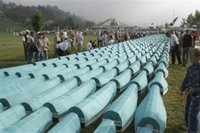 BOSTON, MA: On the 11th anniversary of the Srebrenica massacre, prosecutors and defense attorneys made their closing arguments Tuesday in the immigration fraud trial of a former Bosnian Serb soldier Marko Boskic (ethnic Bosnian Croat) who admitted participating in the carnage and killing 1,200 Bosniaks during Srebrenica massacre.
BOSTON, MA: On the 11th anniversary of the Srebrenica massacre, prosecutors and defense attorneys made their closing arguments Tuesday in the immigration fraud trial of a former Bosnian Serb soldier Marko Boskic (ethnic Bosnian Croat) who admitted participating in the carnage and killing 1,200 Bosniaks during Srebrenica massacre.During closing arguments, Assistant U.S. Attorney Kim West told the jury that Marko Boskic also lied during questioning by federal authorities in 2004, but eventually admitted his role in the Srebrenica massacre after he was shown a video of himself at an awards ceremony for the 10th Sabotage Detachment.
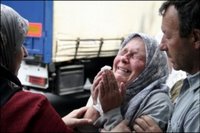 "This is not a war crimes case. This is a case about a man who committed atrocities and lied about it ... in order to gain entry into the United States," West said.
"This is not a war crimes case. This is a case about a man who committed atrocities and lied about it ... in order to gain entry into the United States," West said.West said Boskic also lied when he answered "no" to questions on the immigration forms that asked him if he had ever persecuted or killed anyone on the basis of their race, religion, ethnicity or political beliefs.
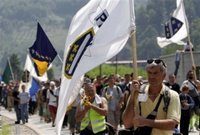 During questioning by federal agents in 2004, Boskic acknowledged he had helped kill 1,200 Bosniak men and boys at a farm outside Srebrenica, where over 8,100 Bosniaks were murdered in 1995 as part of ethnic cleansing by Serb separatists.
During questioning by federal agents in 2004, Boskic acknowledged he had helped kill 1,200 Bosniak men and boys at a farm outside Srebrenica, where over 8,100 Bosniaks were murdered in 1995 as part of ethnic cleansing by Serb separatists.During Boskic's trial, two survivors of the Srebrenica massacre described how soldiers took hundreds of Muslims in buses to a field, then lined them up in groups of 10 and executed them. The survivors said they hid under bodies and eventually crawled over fields of bodies to escape.
 The jury began deliberating Tuesday afternoon on the occassion of 11th anniversary of Srebrenica massacre.
The jury began deliberating Tuesday afternoon on the occassion of 11th anniversary of Srebrenica massacre.If convicted, Boskic faces a maximum sentence of 10 years in prison on each of the four document-fraud charges and five years in prison on the false statement charge.
He also faces deportation to Bosnia-Herzegovina, where he would face war crimes charges.


<< Home